Storm Franklin: Power restored to most NI homes
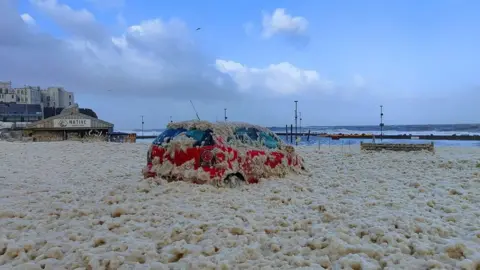 Russell Kennedy
Russell KennedyPower has been restored to most properties after Storm Franklin swept through Northern Ireland.
Northern Ireland Electricity (NIE) said at its peak there were 10,000 properties without power during the early hours of Monday morning.
North Coast Integrated College in Coleraine was forced to close after high winds caused structural damage to the building.
A classroom roof was blown off and the school was closed for safety reasons.
Principal Angela Passmore said it could cost about £10,000 to repair the damage.
"We made the call today to close the school, we are trying to make this structure safe so that we can get pupils back into school, hopefully, tomorrow," she said
 North Coast Integrated College
North Coast Integrated CollegeThe storm also caused thousands of pounds worth of damage to a seafood restaurant in Portstewart.
Waves washed through Native Seafood after the storm caused its shutters to cave in.
"The kitchen equipment has been destroyed," Rebekah McCarry, from Native Seafood, told BBC News NI.
"The fridges switched off and one fell over, spoiling all the food.
"We're trying to salvage as much as we can. We're looking at tens of thousands of pounds worth of damage, the coffee machine alone was £13,000."
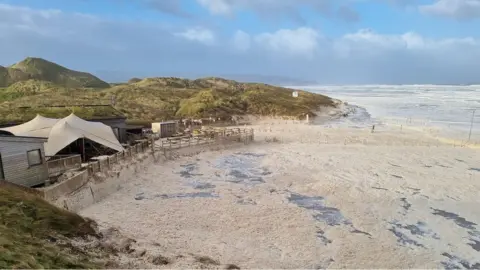 BBC Weather Watcher biggles2390
BBC Weather Watcher biggles2390It was the first time since storm naming began in 2015 that three storms have been named in a single week.
Storm Franklin's strongest gust across Ireland was 140km/h (87mph) at Mace Head in County Galway.
That was stronger than Storm Eunice just a few days earlier when red warnings were issued.
There were no red warnings on this occasion.

The strongest wind gusts for Northern Ireland were:
Orlock Head, County Down: 126km/h (78mph)
Magilligan, County Londonderry: 122km/h (76mph)
Lough Fea, County Derry: 122km/h (76mph)
Ballypatrick, County Antrim: 108km/h (67mph)
Killowen, County Down: 108km/h (67mph)
Castlederg, County Tyrone: 103km/h (64mph)
Portglenone, County Antrim: 101km/h (63mph)

On Sunday, heavy rainfall ahead of Storm Franklin's arrival caused severe flooding in parts of Northern Ireland.
In Omagh, County Tyrone, preventative measures were taken to stop the Drumragh River from bursting its banks.
The Department of Infrastructure said it had dealt with about 331 incidents of flooding and obstructions on roads throughout Sunday and overnight, with 175 of those incidents in the north and west of Northern Ireland.
"Pumps have been deployed and sandbags issued in the worst affected areas," a spokesperson said.
An updated list of road closures caused by the storm can be found on Traffic Watch NI.
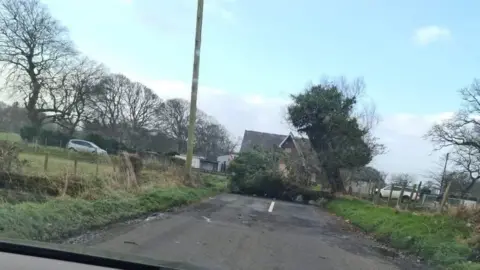 Charlene McGonigle
Charlene McGonigleDergview Football Club's manager Tommy Canning said the club's grounds in Castlederg, which were severely affected by flooding on Sunday, remain submerged under water.
He said the impact of the floods could threaten the club's long-term future.
"We haven't been able to get on the pitch although there was some subsiding of the water but with the storm overnight and continuing into today, you are only looking at the water re-emerging again," he said.
Allow X content?
At the height of the flooding, the ground's main pitch and a new training pitch were both completely submerged.
"It is a real threat to Dergview's existence," he told BBC Radio Foyle.
Mr Canning had said on Sunday the impact of the flood at his club highlights the delay of stadia funding in Northern Ireland.
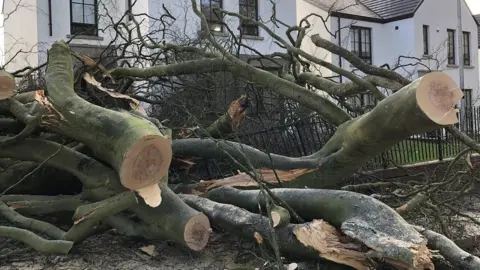
'Phenomenal wave heights'
In the Republic of Ireland, several thousand homes and businesses were still without power at midnight on Monday.
The areas most affected were Sligo and Donegal.
Met Éireann warned of exceptionally high seas with "phenomenal" wave heights of 15.8m reported off the coast of County Donegal.
A yellow wind warning for Wexford and Wicklow has been lifted while an orange wind warning for Donegal, Leitrim and Sligo ended at 07:00 local time.
"These wave heights will remain very high today," the service's meteorologist Deirdre Lowe told the BBC's Good Morning Ulster programme.
"It is going to remain dangerous in the north, west and north-east coast with some very high seas so caution is advised in these areas."
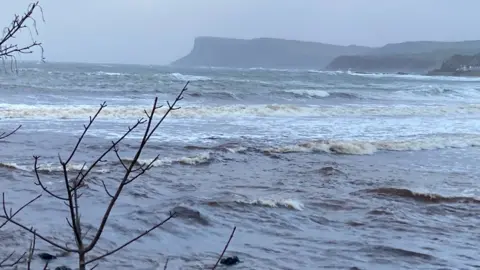
On Friday, Storm Dudley brought heavy rain and strong winds and hundreds of homes in counties Londonderry and Armagh were left without electricity.
This was followed by Storm Eunice, which saw flights and ferries cancelled and snow in some parts of the country.
In the Republic of Ireland, a man was killed after being hit by a falling tree.
